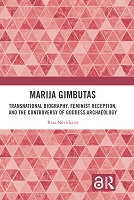Chapter 6 The Archaeologist of Nation and Gender
Proposal review
Gimbutas and Post-Socialist Lithuanian Feminism
Abstract
This chapter is about the reception of Marija Gimbutas in post-socialist Lithuania, in particular among the growing post-socialist women’s rights movements. The chapter outlines the ideological landscape of postsocialism, by focusing on two dominant narratives: the narrative of Western-oriented modernization, or the narrative of transition; and the narrative of nationalist re-traditionalization, or the narrative of return, showing also their gendered implications. Then the chapter presents an original genealogy of post-socialist Lithuanian feminism in the 1990s, and how they dealt with anti-Communism, the idealization of the West, and nationalist discourses. I then discuss Gimbutas’ theories about the prehistory of the Balts, and show how her idealization of the pagan past of Lithuanian ancestors was related to the exaltation of the “feminine element.” The chapter then examines how Gimbutas’ ideas have been taken up by Lithuanian women’s activists in academia and politics. I argue that Gimbutas’ ambiguity regarding femininity and women’s role, her lack of identification with feminism, as well as her narrative of the Lithuanian pagan past and its European belonging allowed feminists of different persuasions to adopt her ideas.


 Download
Download